There were half a dozen musicians, who played upon tom-toms, instruments like a fiddle, and one that was very nearly a hurdy-gurdy, with lutes and flutes. They gave the preliminary strains, and the dancers formed the semicircle. The performance was similar to that the party had seen at the hotel, though it was more finished, and the attitudes and posturing appeared to belong to a higher school of art than the other. But the whole was so nearly like what the strangers had seen before, that they were not absorbed by it, and gave more attention to the people attending the feast; for they were an exceedingly interesting study to them.
After the performance had continued about a quarter of an hour there was a pause, and the dancers retreated to a corner of the room, seating themselves again on the floor. At this moment Sahib Perbut came into the grand saloon leading a boy, who did not appear to be more than ten years old, by the hand. He was dressed in the most richly ornamented garments, and he was an exceedingly pretty little fellow. He was conducted to the viscount.
“Will your Lordship permit me to present to you and your friends my son Dinshaw, in whose honor I am making this feast? This is Lord Tremlyn, my son,” said the father, who was evidently very proud of the boy.
“Sahib Dinshaw, I am very happy to make your acquaintance,” replied his lordship, as he rose and took the hand of the young gentleman, whom he introduced to every member of his party.
They all followed the example of the viscount, and addressed him as “Sahib Dinshaw,” the title being equivalent to “Lord,” or “Master,” applied by the natives to their employers, and to the English generally. All of them gazed at him with intense interest, not unmingled with admiration. The hero of the occasion spoke English as fluently as his father.
“How old are you, Sahib Dinshaw?” asked Mrs. Belgrave, who was strongly tempted to kiss the little fellow; but she was afraid it would not be in order, and she refrained.
“I am ten years old, madam,” replied Dinshaw, with the sweetest of smiles.
“And you have been married this evening, sahib?” continued the lady.
“I should not ask him any questions in that direction,” interposed Sir Modava, afraid she would meddle with an interdicted subject; and the young gentleman’s father seemed to have a similar fear, for he gently led him away.
He was introduced to the members of the “Big Four,” who could hardly keep their faces at the proper length after hearing what passed between the youthful sahib and Mrs. Belgrave, at the idea of a ten-year-old bridegroom.
“Is it possible that this little fellow is married, Sir Modava?” exclaimed the principal lady from Von Blonk Park.
“There can be no doubt of it,” replied the Hindu gentleman. “But it is hardly in the same sense that marriage takes place in England and America. The bride will be received into this Parsee family, and the groom will remain here; but everything in the domestic circle will continue very nearly as it was before, and husband and wife will pursue their studies.”




